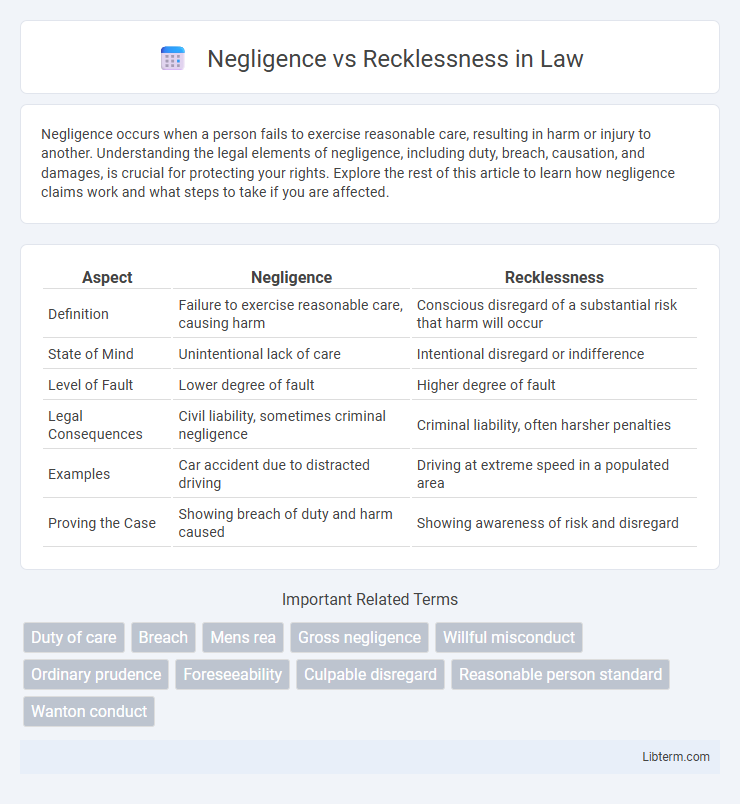Negligence occurs when a person fails to exercise reasonable care, resulting in harm or injury to another. Understanding the legal elements of negligence, including duty, breach, causation, and damages, is crucial for protecting your rights. Explore the rest of this article to learn how negligence claims work and what steps to take if you are affected.
Table of Comparison
| Aspect | Negligence | Recklessness |
|---|---|---|
| Definition | Failure to exercise reasonable care, causing harm | Conscious disregard of a substantial risk that harm will occur |
| State of Mind | Unintentional lack of care | Intentional disregard or indifference |
| Level of Fault | Lower degree of fault | Higher degree of fault |
| Legal Consequences | Civil liability, sometimes criminal negligence | Criminal liability, often harsher penalties |
| Examples | Car accident due to distracted driving | Driving at extreme speed in a populated area |
| Proving the Case | Showing breach of duty and harm caused | Showing awareness of risk and disregard |
Understanding Negligence: Definition and Elements
Negligence involves failing to exercise reasonable care, resulting in harm or damage to another person or property. Key elements include duty of care, breach of that duty, causation linking the breach to the injury, and actual damages suffered. Understanding these components is essential for distinguishing negligence from recklessness, which implies a conscious disregard of known risks rather than mere carelessness.
Defining Recklessness: Key Characteristics
Recklessness involves consciously disregarding a substantial and unjustifiable risk that a particular harm will occur, demonstrating a blatant indifference to the consequences of one's actions. Key characteristics include a deliberate choice to ignore potential dangers and a subjective awareness of the risk involved. This mental state is more culpable than negligence, which entails failing to exercise reasonable care without intentional risk-taking.
Legal Standards: How Courts Distinguish Negligence from Recklessness
Courts distinguish negligence from recklessness by evaluating the defendant's state of mind and the degree of risk awareness involved in their conduct. Negligence occurs when a person fails to exercise reasonable care, resulting in unintended harm, while recklessness involves consciously disregarding a substantial and unjustifiable risk that their actions will cause harm. Legal standards require proving that reckless behavior demonstrates a willful disregard for safety, setting it apart from negligence's lack of intent.
Mental State: Comparing Intent in Negligence and Recklessness
Negligence involves a failure to exercise reasonable care, where the individual does not intend harm but disregards a substantial risk that a reasonable person would recognize. Recklessness, by contrast, requires conscious awareness of a significant risk and a deliberate decision to ignore it, demonstrating a more culpable mental state. The key distinction lies in intent: negligence reflects inadvertent risk-taking, whereas recklessness entails intentional disregard for potential consequences.
Real-World Examples of Negligence
Negligence occurs when a person fails to exercise reasonable care, resulting in harm, such as a driver running a red light and causing a collision. In medical malpractice cases, a surgeon leaving a surgical instrument inside a patient exemplifies negligence due to the breach of standard care. Property owners who neglect to repair known hazards, like a broken staircase leading to a visitor's injury, also illustrate real-world negligence.
Real-World Examples of Recklessness
Recklessness involves conscious disregard of a substantial risk, such as a driver speeding through a red light and causing an accident. In criminal law, cases like drunk driving resulting in injury often illustrate recklessness due to intentional risk-taking despite known dangers. Unlike negligence, which involves carelessness without intentional harm, recklessness requires awareness and intentional disregard of potential consequences.
Consequences: Civil vs. Criminal Liability
Negligence typically results in civil liability where the injured party seeks compensation for damages due to a breach of duty of care, while recklessness can lead to both civil and criminal liability because it involves conscious disregard for a substantial risk. Civil courts handle negligence claims through lawsuits centered on compensation, but reckless behavior often triggers criminal prosecution, potentially resulting in fines, imprisonment, or both. Understanding the distinction is crucial, as recklessness implies a higher degree of culpability with more severe legal consequences compared to negligence.
Proving Negligence vs. Proving Recklessness
Proving negligence requires demonstrating that a person failed to exercise reasonable care, leading to harm, often established through the duty of care, breach, causation, and damages elements. Proving recklessness demands showing that an individual consciously disregarded a substantial and unjustifiable risk, indicating a higher level of culpability than mere negligence. Courts rely on evidence of the defendant's state of mind, conduct, and the risk involved to differentiate between negligence and recklessness in legal proceedings.
Common Defenses for Negligence and Recklessness Claims
Common defenses for negligence claims include contributory negligence, where the plaintiff's own actions partially caused the harm, and assumption of risk, indicating the plaintiff knowingly exposed themselves to danger. In recklessness claims, defenses often focus on challenging the intent or proving a lack of conscious disregard for safety, emphasizing the absence of willful misconduct. Both types of claims require careful examination of the defendant's state of mind and the reasonableness of their actions to determine liability.
Practical Implications: Why the Distinction Matters
Negligence involves a failure to exercise reasonable care, leading to unintended harm, whereas recklessness denotes a conscious disregard of a substantial risk, resulting in more severe legal consequences. This distinction affects liability, with recklessness often triggering punitive damages and harsher criminal penalties compared to negligence. Understanding these differences is crucial for legal professionals when assessing case outcomes, insurance claims, and determining appropriate sanctions.
Negligence Infographic

 libterm.com
libterm.com